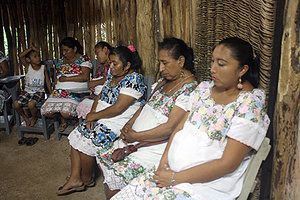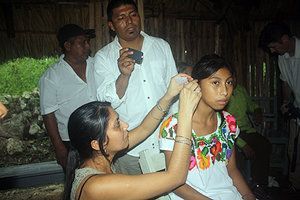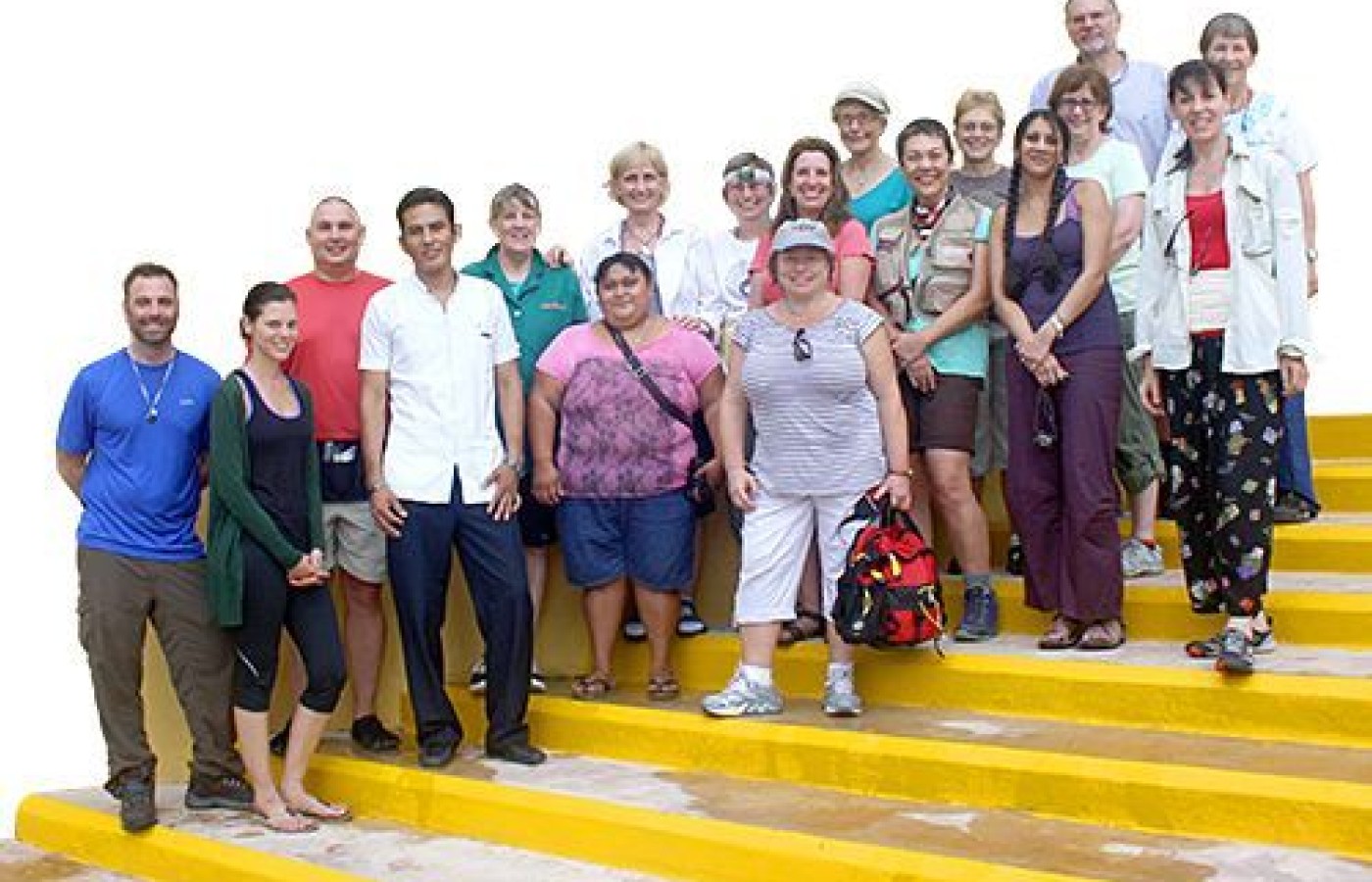The most important relationship I seek to nurture in the treatment room is the one a patient has with their own body. We live in a culture that teaches us to override pain, defer to outside authority, and push through discomfort. Patients often arrive hoping I can “fix” them, but the truth is, we can’t do the work for them. We can offer guidance, insight and support, but healing requires their full participation.
AWB Makes a Difference in the Yucatan
We are in the sleepy town of Izamal, located about an hour from the Merida airport where our group arrived last night. Later that morning, on a bus winding through the dusty roads of the Yucatan, fourteen acupuncturists, two facilitators from Acupuncturists without Borders (AWB) and two tour guides make their way to the small rustic town of Popola.
The healing exchange trip commences with an auspicious blessing by Don Pedro Pablo Chuc Pech, a humble Mayan farmer, healer, teacher and member of the Maya Council of 13 Elders. The ceremony asks for the blessings of Mother Earth's healing energy, as well as the four directions, five elements, the ancestors, animals, minerals and all spirits of nature. We conclude the simple ritual by drinking a porridge-type concoction of cornmeal, and feeling humbled by our heart-opening and deep connection to all of nature.
Don Pedro teaches a fascinating class on deciphering Mayan hieroglyphics in a small oval-shaped hut built of wooden poles and palm leaves that is used as a school. Learning about their struggle to revive interest in this ancient language among the younger generation offers deep insight and appreciation of their ancient culture. He expresses sincerely, "There is such a profound loss of both culture and awareness of the environment. If only people would look at mother nature who teaches us constantly how to be in harmony."
We finish our day by offering a clinic for Don Pedro's family, friends and neighbors who have heard of our work and are curious to know more about acupuncture. Some are medical practitioners themselves and come with many questions about how acupuncture really works. They are inquisitive, patient and deeply receptive, and the sincerity of their questions touches our hearts. In the small, hut we quickly set up chairs in a circle and begin by aligning as a group, a simple ritual to center ourselves and feel connected. This moment shifts the energy in the room, creates a sense of tranquility, and invites patients to become equally receptive. As we needle the patients, the relaxation response builds and a silence quickly descends upon the group.

Everyone is treated with the NADA protocol, five points in each ear that facilitate deep relaxation and detoxification. AWB has used this protocol extensively and developed additional clinic protocols to accompany the auricular method in setting up trauma relief clinics around the U.S. and the global community. AWB's 2013 trainings in the U.S. alone taught 400 acupuncturists how to use this simple yet profound technique in mobile community clinics to treat trauma and stress, as well as to offer general healing to communities.
As is customary on AWB's World Healing Exchange programs, a one-day training was also offered on the first day of our trip. It reviewed the NADA protocol and how it can address symptoms of post-traumatic stress disorder and also covered organizational planning for community clinics, managing with limited resources if necessary, handling crowds of indeterminate size, and managing a team by designating roles and delegating necessary responsibilities: greeter/translator, medical supply coordinator, documenter and practitioners. These are invaluable skills for any acupuncturist who wants to deepen their ability to spread this medicine in our community.
With every clinic we do, it is encouraging to see each acupuncturist gain confidence with their ability to use the NADA protocol, as well as lead and collaborate in a team. After each field experience, we evaluate successful parts of the clinic and openly share what could be improved. We learn quickly that teamwork is key.
Throughout our time in the Yucatan, various clinics are run in the city, rural countryside, town hall centers and makeshift rudimentary locations. Clinics are announced the old-fashioned way: by a town-crier shouting into a loudspeaker riding on the back of a truck or calesa (horse and buggy cart) through the cobble-stoned streets. People of all ages and all walks of life come. "Witnessing the effect these simple treatments had on people who do not have access to our type of medical care hit me at another level entirely," said Emily Schmitt from Minneapolis.

The free clinic in Piste, a small town near the famous Mayan pyramids of Chichen Itza, is a particularly moving and eye-opening experience. After we treat policeman, construction workers and local townspeople, the Mayor arrives to thank AWB and eloquently express his deep appreciation. "Thousands of tourists come daily to visit our pyramids but never glance at the people who live here or acknowledge our poverty. After feeling invisible, we are truly touched that you have seen us and shared your medicine," he said.
On one outing we visit a wise and seasoned local herbalist, Sr. Feliciano Patron Canul. He is dedicated to passing his knowledge on to his daughters and shares with us his diverse herbal pharmacopeia. Many of us benefit from personal consultations with him for our own healing. Having the time to sit with these elders, ask them questions and have them work on us energetically is a tremendous honor.
Our long bus rides are also opportune times to share practice styles, techniques, and information with each other. On one outing, a fascinating class on five-element theory is taught spontaneously by three members of the group.
My favorite part of the trip is meeting Maya Elder and High Priest Don Bartolome Poot Nahuat, Mayan healer extraordinaire. In the small town of Espita, he is a highly respected traditional medicine man who conducts sacred Mayan ceremonies to bless the land, crops and community with ancestral energies and celestial protection.
The reward to each of us is profound in seeing the impact we created and the value of AWB's work in touching lives by introducing our medicine in these cultures. "The simple power of acupuncture in a foreign country, despite language barriers, for people unfamiliar with our medicine, speaks volumes. We understand the power of these treatments is a healing that goes beyond just the hour of deep relaxation," said Massachusetts acupuncturist Dedie King.
The AWB World Healing Exchange experience is both an external journey of sharing our medicine and experiencing the medicine of other cultures, and also an intimate personal exploration of our own healing and what it means to be a healer. It is an understatement to say this AWB experience was a journey of a lifetime. For more information and current news, sign up for AWB's newsletter at www.ACWB.com or call (505) 266-3878.



